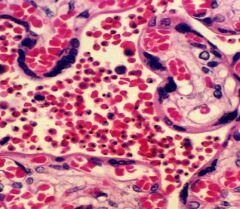 |
Epidemiology
 |
|
Malaria-infected human placenta examined under the microscope. The
intervillous spaces (central area of the picture) are filled with
red blood cells, most of which are infected with Plasmodium
falciparum malaria parasites.
The parasites appear here as black dots. A malaria-infected placenta
is unable to carry out normally its main function: to provide nutrients
to the fetus.
|
Malaria
infection during pregnancy can have adverse effects on both mother and
fetus, including maternal anemia, fetal loss, premature delivery, intrauterine
growth retardation, and delivery of low birth-weight infants (<2500
g or <5.5 pounds).
It
is a particular problem for women in their first and second pregnancies
and for women who are HIV-positive.
The
problems that malaria infection causes differ somewhat by the type of
malaria transmission area: stable (high) or unstable (low) transmission.
-
In high transmission areas, women have gained a level of immunity to
malaria that wanes somewhat during pregnancy. Malaria infection is more
likely to result in severe maternal anemia and delivery of low birth-weight
infants.
- In
low transmission areas, women generally have developed no immunity to
malaria. Malaria infection is more likely to result in severe malaria
disease, maternal anemia, premature delivery, or fetal loss.
Impact
of Malaria During Pregnancy in Sub-Saharan Africa
In
sub-Saharan Africa, the region of the world hardest hit by malaria, malaria
infection is estimated to cause 400,000 cases of severe maternal anemia
and from 75,000-200,000 infant deaths annually. Maternal anemia contributes
significantly to maternal mortality and causes an estimated 10,000 deaths
per year.
Low
birth weight is the greatest risk factor for neonatal mortality and a
major contributor to infant mortality. Although many factors contribute
to low birth weight, malaria is a major factor and one of the few, along
with poor nutrition, anemia, and other infections, that is amenable to
intervention once a woman becomes pregnant.
Prevention
and Control of Malaria During Pregnancy in Sub-Saharan Africa
The
World Health Organization currently recommends a three-pronged approach
to prevent these adverse effects in areas of Africa with high levels of
transmission of Plasmodium falciparum malaria:
- Intermittent
preventive treatment (IPT) with antimalarial drugs
- Insecticide-treated
bed nets (ITN)
- Febrile
malaria case management.
Each
of these interventions is considered safe, effective, affordable, and
deliverable.
Page last modified : October
1,
2004
Content source: Division of Parasitic Diseases
National Center for Zoonotic, Vector-Borne, and Enteric Diseases (ZVED)
|
 |
|



